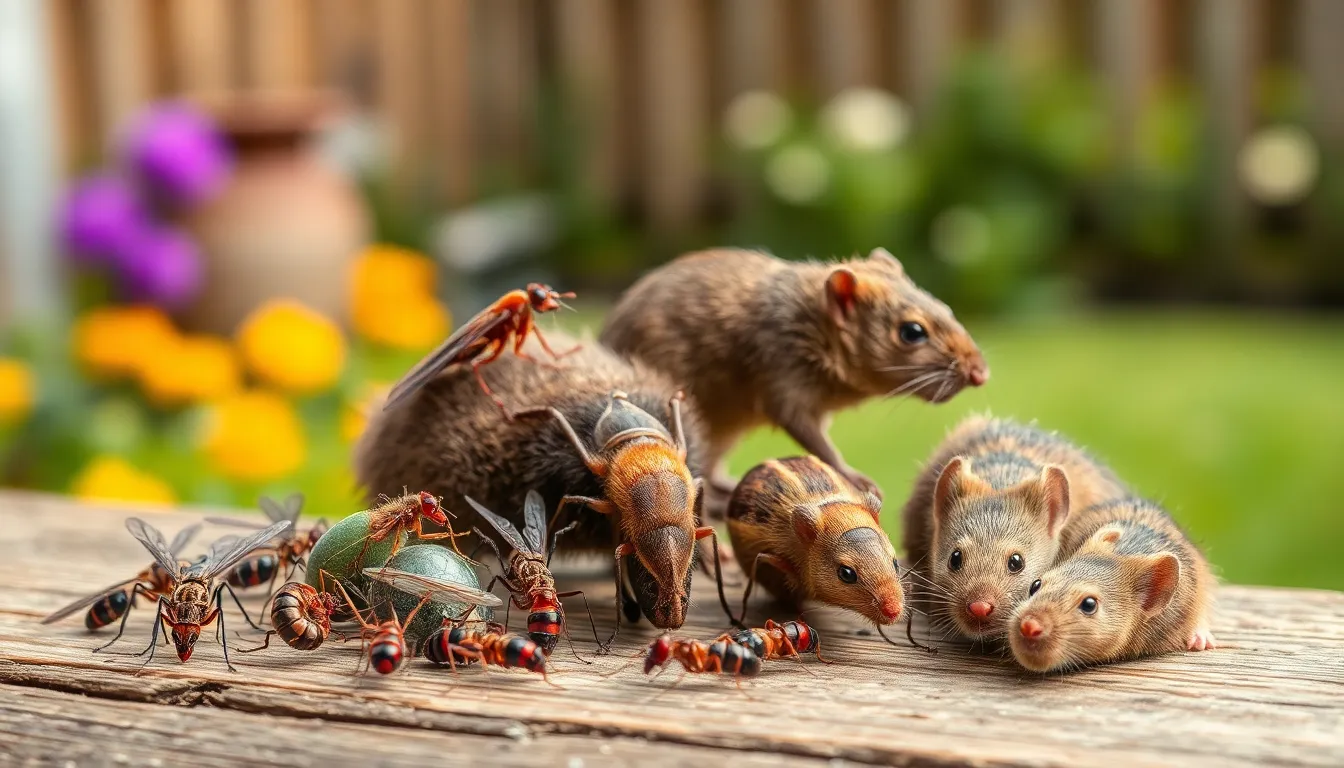Table of Contents
ToggleAs the seasons change, so do the unwelcome guests that invade homes. From ants throwing a summer barbecue to rodents trying to cozy up in winter, pests have a knack for crashing the party. Seasonal pest control isn’t just a chore; it’s an essential strategy to keep these critters at bay and your home comfortable.
Understanding Seasonal Pest Control
Seasonal pest control addresses the specific pest challenges that arise with changing weather patterns. This approach targets various pests at different times of the year.
What Is Seasonal Pest Control?
Seasonal pest control involves tailored strategies aimed at proactively managing pests during their peak activity periods. Each season brings unique pest challenges—from ants and termites in warmer months to rodents and spiders when temperatures drop. Understanding these seasonal variances allows for effective intervention tailored to specific pest behaviors and lifecycle stages. Such an approach helps prevent infestations before they become serious.
Importance of Seasonal Pest Control
Seasonal pest control plays a crucial role in maintaining a comfortable living environment. Effective pest management reduces health risks associated with infestations, as pests often carry diseases that threaten human well-being. Property damage can escalate without regular monitoring, particularly from pests like termites. Additionally, seasonal pest control minimizes the likelihood of pests disrupting daily activities and reduces the need for reactive treatments, which often involve more intensive measures. Consistent application of these preventive strategies contributes to the long-term protection of homes.
Common Seasonal Pests

Different pests invade homes throughout the year. Each season brings specific challenges and types of pests that require focused management strategies.
Spring Pests
Spring marks the emergence of various pests, including ants and termites. With warmer temperatures, ants search for food and build colonies. Termites become active as they seek moisture, posing risks to wooden structures. Homeowners should inspect for entry points and use baits to prevent infestations. Keeping gardens and yards well-maintained helps deter these pests.
Summer Pests
Summer heat attracts a range of pests, particularly mosquitoes and flies. Mosquitoes reproduce in stagnant water, making outdoor spaces uncomfortable. Flies invade homes looking for food sources, often contaminating areas as they feed. Homeowners should eliminate standing water and use screens on windows to minimize intrusion. Employing repellents and traps can effectively reduce fly populations.
Fall Pests
Fall signals a need for rodents and spiders to enter homes. As temperatures drop, rodents seek shelter and food, often invading attics and basements. Spiders appear more frequently as they search for prey. Sealing cracks and keeping food stored securely decreases the likelihood of infestations. Regular cleaning helps eliminate potential spider webs and hiding spots.
Winter Pests
Winter brings unique challenges with rodents and pests seeking warmth. Mice and rats become more aggressive in their search for food, often nesting inside homes. Common pests like cockroaches may also invade, seeking heat and food scraps. Homeowners must ensure all entry points are sealed and maintain cleanliness to deter these pests. Monitoring and setting traps can help control rodent populations effectively.
Effective Seasonal Pest Control Strategies
Effective pest control strategies adapt to seasonal pest behaviors and lifecycle stages. Homeowners benefit from implementing tailored techniques that target specific pests during peak activity times.
Prevention Techniques
Identifying potential entry points becomes crucial in preventing pests. Sealing cracks in doors and windows blocks unwanted intrusion. Regular cleaning helps eliminate food sources, reducing attraction for pests. Maintaining landscaping ensures that plants aren’t overcrowded, which invites pests like ants. Finally, setting up traps in strategic locations deters rodents and easily helps monitor pest activity.
Treatment Options
Using bait stations offers a targeted approach for managing specific pests. Insecticides can effectively eliminate ants and termites during spring. For summer’s mosquitoes, applying larvicides to standing water actively reduces their population. Rodenticides serve as a method for dealing with rodents in fall and winter. Integrated pest management combines these treatment options, ensuring a comprehensive strategy that aligns with seasonal changes. Prioritizing regular inspections provides homeowners with the chance to address issues early on.
Choosing the Right Pest Control Service
Selecting the appropriate pest control service is crucial for effective seasonal management. An informed decision improves the chances of maintaining a pest-free home during peak activity periods.
Factors to Consider
Evaluating qualifications remains essential. Licensing and certifications confirm expertise and compliance with regulations. Consider the company’s experience. Providers with a strong track record often demonstrate proven results. Assess treatment options. Effective services offer personalized strategies tailored to specific pest types and seasonal changes. Service plans matter as well; flexible packages allow homeowners to adapt based on varying pest pressures throughout the year. Reputation influences choices. Customer reviews and ratings provide insights into a company’s reliability and effectiveness.
Questions to Ask
Inquiring about the methods used is important. Understanding whether the service employs eco-friendly or chemical options helps determine compatibility with homeowner preferences. What kind of warranties are available? Satisfactory guarantees ensure peace of mind regarding treatment outcomes. Consider asking about procedures for follow-ups. Consistent monitoring signifies a commitment to long-term pest management. Pricing structures also warrant discussion. Transparency regarding costs and potential additional fees prevents surprises later. Lastly, querying about technician training offers reassurance regarding the competency of field staff.
Seasonal pest control is essential for maintaining a comfortable and healthy home. By understanding the unique challenges posed by different pests throughout the year, homeowners can implement effective strategies to prevent infestations. Proactive measures such as sealing entry points and maintaining cleanliness can significantly reduce the risk of unwanted guests.
Choosing the right pest control service enhances these efforts, ensuring tailored solutions that fit specific needs. Regular inspections and an integrated approach to pest management provide peace of mind and long-term protection. Staying ahead of seasonal pest activity not only safeguards the home but also promotes a safer environment for all inhabitants.





